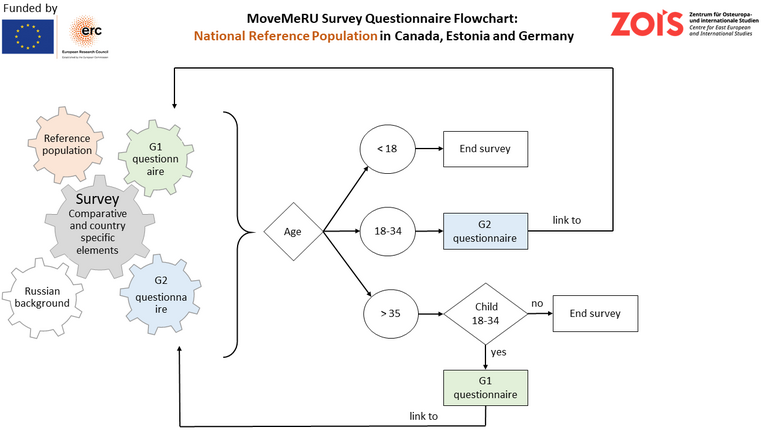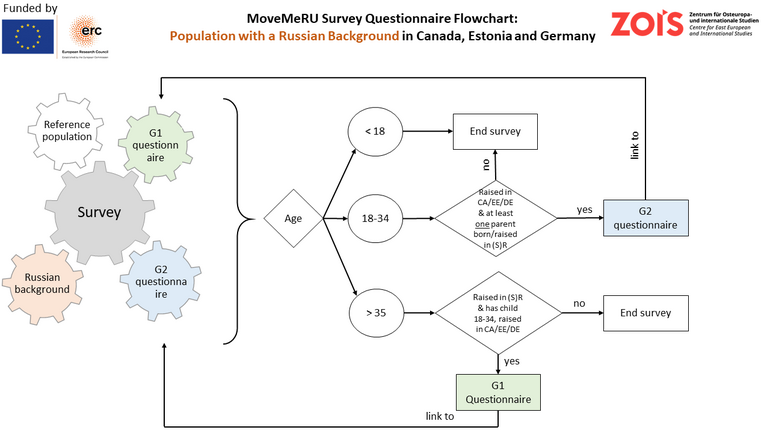Surveys in Focus: Voices across Generations
In collaboration with local research partners in Canada, Estonia and Germany, we conducted original online surveys targeting parent-child dyads. The goal was to refine our understanding of the interplay between historical memories and political attitudes within families with a migratory background and the general populations. Multigenerational surveys are one promising way to examine how the family level generates social and political views derived from attitudes towards history. The surveys explore attitudes towards democracy, ethnicity, multiculturalism, liberalism, patriotism or questions of social tolerance. This data will improve our understanding of the transmission of historical memories and allow us to assess the impact of the migration experience on the process.
The underlying design of the surveys is as follows:


NOTE: ‘(Soviet) Russia’ pertains to citizenship and carries no ethnic connotations; it is used to indicate a historical association with the country.
MoveMeRU is dedicated to illuminating globally significant societal dynamics within three distinct research domains.
Identifications and Homeland attachments: The initial research question centres on the nuanced relationships that young adults uphold with their parents’ country of origin. We explore the historical settings that sculpt their identities and forge deep or loose attachments between young adults and their parental homelands.
At the core of our investigation lies the enduring legacy of family heritage, which influences the beliefs, values, and affiliations of young adults. Multigenerational surveys enable us to explore the transmission of historical narratives within families, revealing latent layers of familial significance. Within this context, we analyse the interplay of identities that shape young adults’ self-perceptions and their attachments to parental homelands. The multigenerational lens sheds light on the complex ways in which individuals navigate their multiple affiliations. This empirical focus also illuminates pathways to cultural continuity and rupture.
Convergence and Divergence in Generational Memory: The second research focus explores the relationship between generations as expressed in their assessments of history. Such assessments are passed down from generation to generation, with factors such as the political context, how history is taught at school, or a family’s historical experiences interfering with the family dynamic. Surveys allow us to unpack these various dynamics and identify the driving forces behind convergence and divergence across generations. The broader goal here is to contribute to discussions on the persistence of cultural and historical legacies, the intergenerational transmission of memory, and complex processes of intergenerational influence.
Historical Memory and Political Attitudes: Political actors frequently have recourse to historical arguments to justify a present-day course of action. A political decision is thus portrayed as a natural development within a specific historical narrative. In this third research domain we focus on the ways in which historical memories contribute to, or impede, the formation of solidarity and pluralistic political attitudes. The past resonates within contemporary political settings, shaping competing ideas about what society should look like.
This relationship is far from straightforward, despite the visibility of historical arguments in political debates. Scholars are divided on the potential merits of inclusive remembering practices, with many suggesting that interpretations of the past are inevitably conflictive. How historical events are framed and understood can significantly shape the political attitudes and beliefs of individuals. With the multigenerational surveys, we show under what conditions historical attitudes shape particular political preferences and behaviour such as voting or involvement in civil society.
Our research extends to in-group and out-group dynamics among politically opposing groups. Drawing on studies which show increasing family agreement on political issues across generations, we investigate the role of the family as a political fortress. These findings have profound implications for intergroup relationships, solidarity, and social unity.
The outcomes from the parent-child surveys will steer and enrich the cross-generational focus groups within the same countries.
Back to Survey Overview
Click here for some General Information about our Surveys